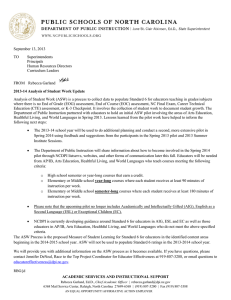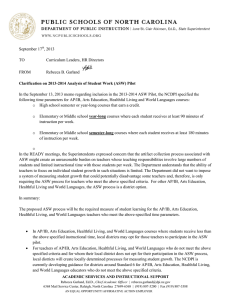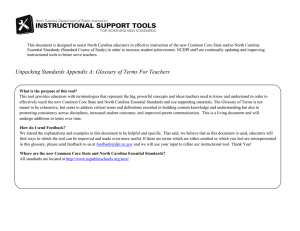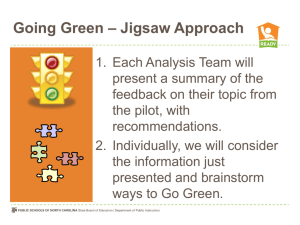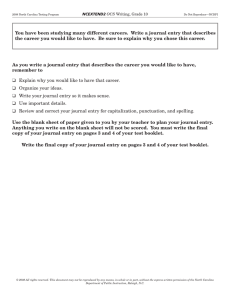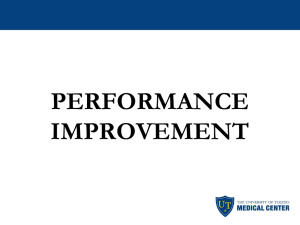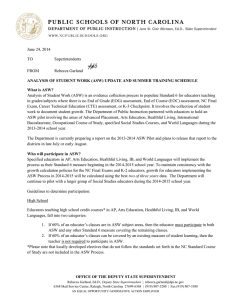Document 10906675
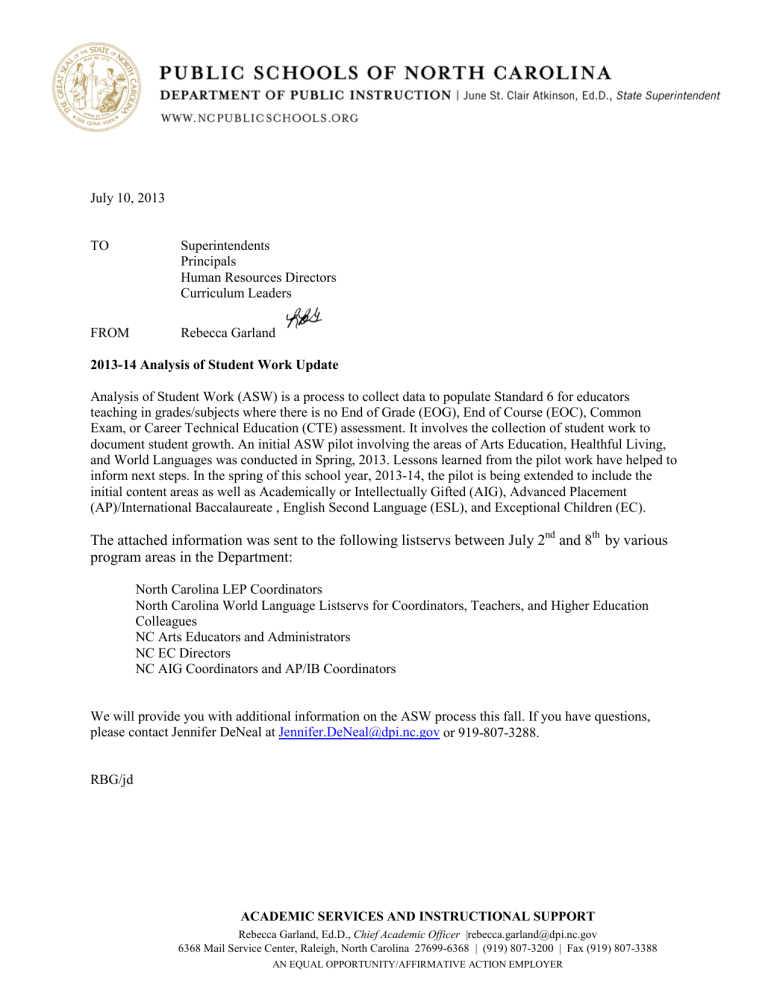
July 10, 2013
TO Superintendents
Principals
Human Resources Directors
Curriculum Leaders
FROM Rebecca Garland
2013-14 Analysis of Student Work Update
Analysis of Student Work (ASW) is a process to collect data to populate Standard 6 for educators teaching in grades/subjects where there is no End of Grade (EOG), End of Course (EOC), Common
Exam, or Career Technical Education (CTE) assessment. It involves the collection of student work to document student growth. An initial ASW pilot involving the areas of Arts Education, Healthful Living, and World Languages was conducted in Spring, 2013. Lessons learned from the pilot work have helped to inform next steps. In the spring of this school year, 2013-14, the pilot is being extended to include the initial content areas as well as Academically or Intellectually Gifted (AIG), Advanced Placement
(AP)/International Baccalaureate , English Second Language (ESL), and Exceptional Children (EC).
The attached information was sent to the following listservs between July 2
nd
and 8
th
by various program areas in the Department:
North Carolina LEP Coordinators
North Carolina World Language Listservs for Coordinators, Teachers, and Higher Education
Colleagues
NC Arts Educators and Administrators
NC EC Directors
NC AIG Coordinators and AP/IB Coordinators
We will provide you with additional information on the ASW process this fall. If you have questions, please contact Jennifer DeNeal at Jennifer.DeNeal@dpi.nc.gov
or 919-807-3288.
RBG/jd
ACADEMIC SERVICES AND INSTRUCTIONAL SUPPORT
Rebecca Garland, Ed.D., Chief Academic Officer |rebecca.garland@dpi.nc.gov
6368 Mail Service Center, Raleigh, North Carolina 27699-6368 | (919) 807-3200 | Fax (919) 807-3388
AN EQUAL OPPORTUNITY/AFFIRMATIVE ACTION EMPLOYER
To: North Carolina LEP Coordinators
North Carolina World Language Listservs for Coordinators, Teachers, and Higher Education Colleagues
NC Arts Educators and Administrators
NC EC Directors
NC AIG Coordinators and AP/IB Coordinators
Subject: 2013-14 ASW Update
Analysis of Student Work (ASW) is a proposed process where educators in performance-based and/or service-based areas collect student work samples from two different points in time. These samples are submitted for “blind review” by content experts and assessed for growth in relation to a single objective from the North Carolina Essential Standards or other appropriate standards. Collections of student work samples would be evaluated each year and averaged over three consecutive years to form a Standard 6 rating. The Standard 6 rating will be used with ratings from Standards 1-5 to determine a teacher’s overall effectiveness status: In Need of Improvement, Effective, or Highly Effective. An initial ASW pilot involving the areas of Arts Education, Healthful Living, and World Languages was conducted in Spring 2013. This pilot has informed the next steps for the 2013-2014 School Year:
• The 2013-14 School Year will be used to do additional planning and conduct a second, more extensive pilot in Spring 2014 using feedback and suggestions from the tremendous work of the participants in the Spring 2013 pilot. Results of the initial pilot indicated that further study is needed on this process.
• Information about how to become involved in the Spring 2014 pilot will be shared at the 2013
Summer Institutes and through NCDPI listservs, websites, and other forms of communication.
Educators will be needed from AIG, AP/IB, Arts Education, English as a Second Language, Exceptional
Children, Healthful Living, and World Languages.
• The ASW Process is the proposed Measure of Student Learning for Standard 6 of the North Carolina
Educator Evaluation System (NCEES) for educators in the identified content areas beginning in the
2014-15 School Year. ASW will not be used for Standard 6 ratings in the 2013-2014 School Year.
• The North Carolina Department of Public Instruction (NCDPI) introductory information on the
Standard 6 ASW Process for Arts Education, Healthful Living, and World Language educators will be available beginning July 8, on the 2013 Summer Institute participant wiki
( http://si2013.ncdpi.wikispaces.net/ ) under the Design Studios Sessions for the “Analyzing Student
Work to Change Teacher Practice” link. More guidance from the NCDPI will occur throughout this coming year of fall planning and spring piloting.
